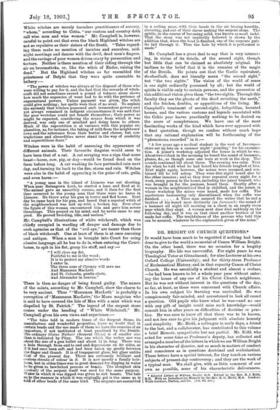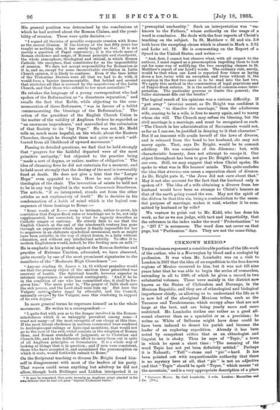DR. BRIGHT ON CHURCH QUESTIONS.*
IT would have been much to be regretted if nothing had been done to give to the world a memorial of Canon William Bright. On the other hand, there was no occasion for a lengthy biography. His life was uneventful. For eight years he was
• Theological Tutor at Glenalmond ; for nine Lecturer at his own Oxford College (University) ; and for thirty-three Professor of Ecclesiastical History, and in that capacity Canon of Christ Church. He was essentially a student and almost a recluse, —he had been known to let a whole year pass without enter- ing the house of any one of his Christ Church neighbours. But he was not without interest in the questions of the day, so far, at least, as these were concerned with Church affairs. In his own subject his learning was unrivalled. He was conspicuously fair-minded, and accustomed to look all round a question. Old pupils who knew what he was—and no one with any gift of insight could miss such knowledge—would consult him in after years on difficulties of doctrine or prac- tice. He was sure to know all that there was to be known, and not less sure to give his judgment with absolute honesty and simplicity. Mr. Medd, a colleague in early days, a friend to the last, and a collaborator, has contributed to this volume a brief Memoir, sympathetic but not partial. Mr. Kidd, who acted for some time as Professor's deputy, has collected and arranged a number of the letters in which we see William Bright in his character of director, not so much in matters of conduct and conscience as in questions doctrinal and ecclesiastical. These letters have a special interest, for they touch on various subjects of present-day controversy; and they are the work of a typical man. We shall give, with as little comment of our own as possible, some of his characteristic deliverances.
• Selected Letters of Waliam Bright. D.D. Edited by the Bev. B. J. Kidd, S.D. With an Introductory Memoir by the Bev. B. G. Maid, M.A.. London,' Wells Gardner, Darton, and Co. LIOe. 6d. net.3
His general position was determined by the conclusions at which he had arrived about the Roman Claims, and the possi- bility of reunion. These were quite decisive :—
"I regard all theories of possible corporate reunion with Rome as the merest illusion. If the history of the last fifty years has taught us nothing else, it has surely taught us that. It is not merely a question of Papal supremacy ; it is the whole mass of Roman obedience and usage, of Roman principle and standpoint, the whole atmosphere, theological and ethical, in which Roman Catholic life energises, that constitutes for us the impossibility of reunion. We dare not accept responsibility for Romanism as it is, and as, except for some inconceivable revolution in Latin Church opinion, it is likely to continue. Even if the bare letter of the Tridentine Decrees were all that we had to do with, it would form a barrier insurmountable. But behind and around that stretches all that is covered by the magisterium of the Latin Church, and that those who submit to her must assimilate."* He rebukes the language of a young correspondent who had spoken of the Reformation as "a disastrous separation," and recalls the fact that Keble, while objecting to the com- memoration of three Reformers, "was in favour of a tablet lommemorating the blessings of the Reformation." The action of the president of the English Church Union in the matter of the validity of Anglican Orders he regarded as "an enormous imprudence," and marvelled at the submission of that Society to its "lay Pope." He was not, Mr. Medd tells us, much more hopeful, on the whole, about the Eastern Churches, though he thought them not quite so much "self- barred from all likelihood of upward movement."
Passing to detailed questions, we find that he held strongly that "prayers for the faithful departed were of the most primitive antiquity," but objected to the practice being "made a sort of dogma, or rather, matter of obligation." The idea of cleansing fires he did not entertain for a moment, and be held most strongly that the destiny of the soul is irrevocably fixed at death. He does not give a hint that the "Larger Hope" even appealed to him. Here he was altogether a theologian of the chair. The invocation of saints he held not to be in any way implied in the words Communio Sanctorum. The article, "if so interpreted, stands out from the other articles as not explanatory of itself." He is decisive in his condemnation of a habit of mind which is the logical con- sequence of these leanings to Rome :—
"Some words of X— seem to intimate, rather to avow, his conviction that Prayer-Book rules or teachings are to be, not only supplemented, but corrected, by what he vaguely describes as Catholic usages or customs. He utterly fails to see that the English Church at the end of the nineteenth century has gone through an experience which makes it finally impossible for her to acquiesce in an elaborate symbolical ceremonial, such as might have been suitable, in the way of object lesson, to a laity without education, and without any intellectual activity. To offer it to modern Englishmen would, indeed, be like feeding men on milk !"
He is emphatic in his protest against the Roman doctrine and practice of Extreme Unction, advocated, we have observed, quite recently by one of the most prominent signatories to the manifesto of the "Moderate High Churchmen" :—
"Anyone reading St. James v. 14, 15 without prejudice would see that the primary object of the unction there prescribed was recovery of health. The Spiritual benefit, however superior in intrinsic importance, is mentioned contingently. And if he be in the condition of one who has committed sins, it shall be for- given him.' The main point is, The prayer of faith shall save the sick person, and the Lord shall raise him up.' But here the Vulgate mistrrIeslates J•yepei by alleviabit, and the Council, naturally swayeo by the Vulgate, uses this rendering in support of its own dogma."
In more general terms he expresses himself as to the whole movement. He writes to a correspondent : —
"I quite feel with you as to the danger involved in the Roman- mindedness which is so unhappily prevalent among some—I trust not many—of the most energetic of our clergy at this time. If the most literal obedience in matters ceremonial were rendered to Archiepiscopal rulings or Episcopal monitions, that would not go to the root of the evil, which consists in the adoption of Roman ideas, and Roman standards of judgment, as to Christian and Church life, and in the deliberate effort to carry them out in spite of all Anglican principles or formularies. It is a whole way of looking at things that is in question ; and if men were consistent, those who have accepted it, and assimilated the preconception on which it rests, would forthwith submit to Rome."
On the Scriptural teaching re divorce Dr. Bright found him- self in disagreement with most of the leaders of his party.
That 7ropyeIce could mean anything but adultery he did not allow, though both Dollinger and Liddon interpreted it as
• It may be remarked that quite recently an Anglican priest pleaded in his own defence that he had not gone "beyond Tridentine limits."
"prenuptial unchastity." Such an interpretation was "un- known to the Fathers," whose authority on the usage of a word is conclusive. He deals with the four reports of Christ's teaching on the subject. In St. Matthew v. 32 and xix. 3-9 both have the excepting clause which is absent in Mark x. 2-12 and Luke xvi. 18. He is commenting on the Report of a. Synod in the United States, and writes:—
" And, first, I cannot but observe what, with all respect to the authors, I must regard as a preconception impelling them to look out for some way of nullifying the two excepting clauses in St. Matthew's report of our Lord's words. The ordinary rule, surely, would be that when our Lord is reported four times as laying down a law, twice with an exception and twice without it, the exception in the first two cases is to be read into the last two. We apply this method in the construction of legal provisions and of Prayer-Book rubrics. It is the method of common-sense inter- pretation. The particular governs or limits the general; the fuller statement fills out the briefer."
The logical result of his opinions was a curious difficulty. If "put away" (civroX6o) meant, as Dr. Bright was confident it
did mean, "to dissolve the marriage," then the adulterous wife, ceasing to be a wife, is free to marry again, and to marry whom she will. The Church may refuse its blessing, but the
civil marriage is a marriage, and must be recognised as such- " The Church in her administration of Sacraments would not, as far as I can see, be justified in denying to it that character."' But if an innocent wife avails herself of the laws of divorce,. and is released from the bond to her husband, she may not marry again. That, says Dr. Bright, would be to commit adultery. He was conscious of the dilemma; but, with characteristic honesty, does not attempt to escape it. Our object throughout has been to give Dr. Bright's opinions, not. our own. Still, we may suggest that when Christ spoke, He spoke to what was in His bearers' minds. This quite excludes the idea that ciiro.1;sty can mean a separation short of divorce. As Dr. Bright puts it, "the Jews did not care about that." May it not also account for the fact that the husband only is spoken of ? The idea of a wife obtaining a divorce from her husband would have been as strange to Christ's hearers as that of the earth going round the sun. May not the spirit of the dictum be that this sin, being a contradiction to the essen- tial purpose of marriage, makes it void, whether it be com- mitted by husband or by wife ?
We venture to point out to Mr. Kidd, who has done his work, as far as we can judge, with tact and impartiality, that the reference in the index under the word " Protestantism " to p. "287 f." is erroneous. The word does not occur on that. page, but "Puritanism" does. They are not the same thing.











































 Previous page
Previous page